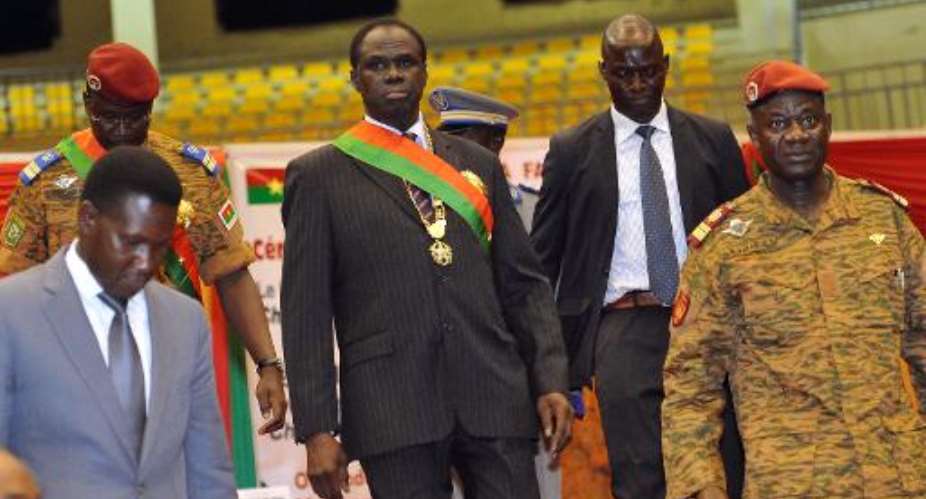Ouagadougou (AFP) - Burkina Faso's interim leaders are expected to unveil a new government lineup on Sunday, with the country anxious to see the extent of military influence under civilian President Michel Kafando.
Kafando, a former diplomat, took office on Friday to steer the west African nation for a transitional period after veteran president Blaise Compaore was toppled in a wave of popular unrest last month.
But intense wrangling over cabinet posts delayed the announcement of the government to be headed by interim prime minister Isaac Zida, who led a military power grab after Compaore was ousted on October 31.
An army officer close to Zida said the cabinet lineup would be announced at around 1700 GMT after being finalised overnight.
The shape of the new government was initially expected to be unveiled on Thursday, and then Saturday, but has been held up by differences between the rival parties.
One source said the delay was caused by the army's opposition to several ministerial candidates proposed by civil society groups.
Zida formally handed power to Kafando, a 72-year-old former foreign minister and career diplomat, in a ceremony attended by six African heads of state on Friday.
However, despite the civilian shift, it is expected that the military will retain a strong say in government.
An early draft cabinet list prepared by the military and seen by AFP showed the army wanted all the most important positions in the 25-member government, including defence, internal security, and mining.
Civilians chosen by the military were to get the foreign, finance, justice, and budget posts, according to the document.
That would leave Kafando free to name only relatively minor ministers, such as industry, communication and scientific research.
Some civil society representatives have voiced concern over Zida's appointment and some residents of Ouagadougou called it a betrayal of their "revolution".
Both Kafando and Zida are barred from standing in elections scheduled to be held in November next year under the transition deal.
But a diplomat said: "Make no mistake, it's (Zida) who will lead the country."
- Promise of people power -
Zida, 49, was appointed premier by Kafando on Wednesday, a day after the former UN ambassador was sworn in as interim leader.
Chosen after negotiations between political parties, the army and civil society, Kafando has emphasised his "humility" as a figure entrusted with "power that belongs to the people".
Kafando has pledged he will not let his landlocked nation of 17 million people become a "banana republic".
He vowed to punish those responsible for excesses during the 27-year rule of Compaore, who was very close to slain Libyan dictator Moamer Kadhafi and Liberian warlord-turned-president Charles Taylor, currently jailed for war crimes.
"We will settle accounts with all those who have abused justice and who think they can syphon off public funds," Kafando said.
"The message of the people is clear and we have heard it," he said. "No more injustice, no more chaos, no more corruption."
Compaore, meanwhile, flew into Morocco Friday on a visit from Ivory Coast, where he fled after an uprising against a constitutional change that could have enabled him to extend his hold on power.
Under intense international pressure, and the threat of sanctions if the military retained the post of head of state, an agreement was thrashed out to work towards elections in November 2015.
Burkina Faso notably exports cotton and gold, but almost half the population lives on less than a dollar a day and many are subsistence farmers.
Every change of regime in the country has been triggered by a coup since independence from France in 1960, when it was called Upper Volta.





 Akufo-Addo spotted ordering chiefs to stand for his handshake
Akufo-Addo spotted ordering chiefs to stand for his handshake
 Akufo-Addo ‘disrespects’ every chief in Ghana except Okyenhene — NDC Communicato...
Akufo-Addo ‘disrespects’ every chief in Ghana except Okyenhene — NDC Communicato...
 Supreme Court clears way for dual citizens to hold key public positions
Supreme Court clears way for dual citizens to hold key public positions
 Be transparent, don’t suppress the truth – Prof. Opoku-Agyemang to Jean Mensa
Be transparent, don’t suppress the truth – Prof. Opoku-Agyemang to Jean Mensa
 ‘I won’t tell the world I was only a driver’s mate during challenges’ – Prof Jan...
‘I won’t tell the world I was only a driver’s mate during challenges’ – Prof Jan...
 We’ll prosecute corrupt officials of Akufo-Addo’s govt – Prof Jane Naana
We’ll prosecute corrupt officials of Akufo-Addo’s govt – Prof Jane Naana
 [Full text] Acceptance speech by Prof Jane Naana Opoku-Agyemang as 2024 NDC Runn...
[Full text] Acceptance speech by Prof Jane Naana Opoku-Agyemang as 2024 NDC Runn...
 Election 2024: Don’t be complacent, we haven’t won yet – Asiedu Nketia cautions ...
Election 2024: Don’t be complacent, we haven’t won yet – Asiedu Nketia cautions ...
 Election 2024: Stop fighting over positions in Mahama’s next govt – Asiedu Nketi...
Election 2024: Stop fighting over positions in Mahama’s next govt – Asiedu Nketi...
 Prof Jane Naana Opoku-Agyemang will restore dignity of vice presidency – Fifi Kw...
Prof Jane Naana Opoku-Agyemang will restore dignity of vice presidency – Fifi Kw...
